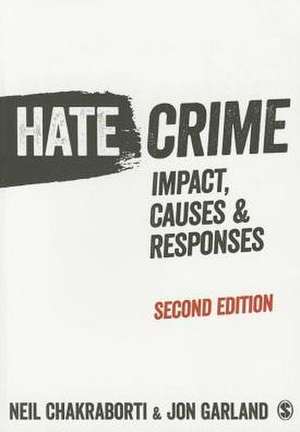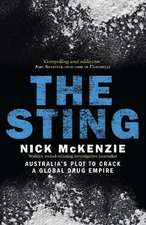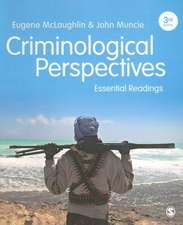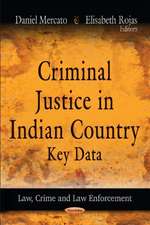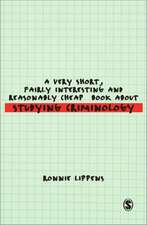Hate Crime: Impact, Causes and Responses
Autor Neil Chakraborti, Jon Garlanden Limba Engleză Paperback – 31 mar 2015
The second edition features expanded discussions of international perspectives and contemporary topics such as online hate and cyberbullying, as well as numerous case studies covering issues such as lone wolf extremists, Islamophobia, asylum seekers and the far right. The book contains a range of links to online material that accompany the extensive lists of further reading in each chapter.
Preț: 385.91 lei
Nou
Puncte Express: 579
Preț estimativ în valută:
73.85€ • 77.01$ • 61.38£
73.85€ • 77.01$ • 61.38£
Carte tipărită la comandă
Livrare economică 21 martie-04 aprilie
Preluare comenzi: 021 569.72.76
Specificații
ISBN-13: 9781446272510
ISBN-10: 1446272516
Pagini: 208
Dimensiuni: 170 x 242 x 11 mm
Greutate: 0.36 kg
Ediția:Second Edition
Editura: SAGE Publications
Colecția Sage Publications Ltd
Locul publicării:London, United Kingdom
ISBN-10: 1446272516
Pagini: 208
Dimensiuni: 170 x 242 x 11 mm
Greutate: 0.36 kg
Ediția:Second Edition
Editura: SAGE Publications
Colecția Sage Publications Ltd
Locul publicării:London, United Kingdom
Recenzii
In this second edition of Hate Crime, Chakraborti and Garland broaden the scope of their analysis to thoughtfully reflect on dramatic changes in the realms of theory, research and policy that have characterized the field in the intervening 6 years since the first edition. They draw attention to our increased awareness of the complexity and ambiguity of hate crime, challenging readers to question many taken for granted assumptions of previous scholarship. This thoroughly researched and accessible text deftly captures the contexts and consequences of hate crime, giving due consideration to both victims and offenders, as well as the relationships between them. What is especially welcome is the weight given to "ways forward." The authors' emphasis on policy innovations within and beyond the UK will undoubtedly shape the scholarly and practical discourses around how we confront hate crime globally.
Comprehensive, informed, full of ideas, and yet accessible. The completely revised and fully updated second edition of this terrific book, by two of the leading scholars in the field, is an absolute must for anyone interested in the field of hate crimes.
The concept of hate crime has been widely debated by academics but there is unlikely to ever be a broad consensus. However, the realities of the harm it causes to individuals and communities are all too real and UK Governments have recognized the value of decisions having a sound academic foundation. Fortunately there are a core group of academics in the UK who have moved on from the conceptual, to focus on its practicalities. Neil Chakraborti and Jon Garland have contributed greatly to this practical wave of research and this updated volume is a useful step forward, addressing some recent emerging elements of policy and practice.
A very useful read for students or practitioners wanting to expand their understanding of this important area. The text is up-to-date, covering such recent developments as the murder of Lee Rigby and the rise of recent far right street movements. The source material encompasses a wide range of international research but also the impressive work of the two central authors who are clearly leaders in the field... I [recommend] this book to all with an interest in the field who would benefit from an extremely competent and illuminating overview.
Comprehensive, informed, full of ideas, and yet accessible. The completely revised and fully updated second edition of this terrific book, by two of the leading scholars in the field, is an absolute must for anyone interested in the field of hate crimes.
The concept of hate crime has been widely debated by academics but there is unlikely to ever be a broad consensus. However, the realities of the harm it causes to individuals and communities are all too real and UK Governments have recognized the value of decisions having a sound academic foundation. Fortunately there are a core group of academics in the UK who have moved on from the conceptual, to focus on its practicalities. Neil Chakraborti and Jon Garland have contributed greatly to this practical wave of research and this updated volume is a useful step forward, addressing some recent emerging elements of policy and practice.
A very useful read for students or practitioners wanting to expand their understanding of this important area. The text is up-to-date, covering such recent developments as the murder of Lee Rigby and the rise of recent far right street movements. The source material encompasses a wide range of international research but also the impressive work of the two central authors who are clearly leaders in the field... I [recommend] this book to all with an interest in the field who would benefit from an extremely competent and illuminating overview.
Cuprins
Chapter One: Understanding Hate Crime
Chapter Two: Racist Hate Crime
Chapter Three: Religiously Motivated Hate Crime
Chapter Four: Homophobic Hate Crime
Chapter Five: Transphobic Hate Crime
Chapter Six: Disablist Hate Crime
Chapter Seven: Vulnerability, ‘Difference’ and Gendered Violence
Chapter Eight: Perpetrators of Hate Crime
Chapter Nine: Responding to Hate Crime
Chapter Ten: International Perspectives on Hate Crime
Chapter Eleven: Conclusions and Future Directions
Chapter Two: Racist Hate Crime
Chapter Three: Religiously Motivated Hate Crime
Chapter Four: Homophobic Hate Crime
Chapter Five: Transphobic Hate Crime
Chapter Six: Disablist Hate Crime
Chapter Seven: Vulnerability, ‘Difference’ and Gendered Violence
Chapter Eight: Perpetrators of Hate Crime
Chapter Nine: Responding to Hate Crime
Chapter Ten: International Perspectives on Hate Crime
Chapter Eleven: Conclusions and Future Directions
Notă biografică
Descriere
Covering racist, religiously motivated, homophobic and disablist hate crime, along with gender and violence, this book provides readers with a fully up-to-date exploration of the relation of hatred and prejudice to crime and criminal justice. Updates include expanded discussions of international perspectives and contemporary topics such as online hate and cyberbullying, and case studies covering issues such as lone-wolf extremists and Islamophobia.
